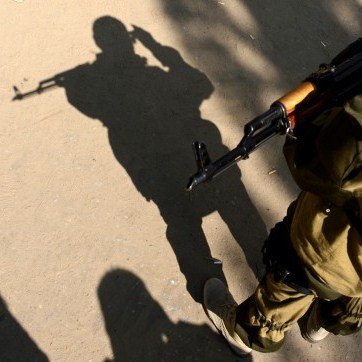Amidst all the talk of whether the Russian or Ukrainian government bears greater responsibility for the violence in eastern Ukraine and Odessa, we may be losing sight of a crucial dynamic that is happening on the ground. Local armed men in Donetsk, Luhansk, Odessa and elsewhere have started down the slippery slope to warlordism — and Moscow may be encouraging this trend.
Warlords, as I discuss in my 2012 book of that same name, are individuals who control small slices of territory using a combination of force and patronage. They are distinct from rebels, because their goal is not really to overthrow a government. Instead they often cooperate and collude with weak, corrupt, or frightened state employees (including bureaucrats and security forces) to maintain their local control. While they may have ideologies and passions, warlords are fundamentally self-interested: What they want more than anything else is to stay in a position of power, so they can coerce and blackmail their opponents while controlling payouts to their allies and clients.
Warlords are not just machine-boss politicians, because they are backed by private militias that are willing to go to war to keep them in control. And while they are sometimes popular, and good at distributing the wealth to their communities, warlords rely on illegal activities like smuggling and informal financial links with outside players—not local taxes—for their resources. This latter point is crucial, because as Margaret Levi points out in her classic book, “Of Rule and Revenue,” taxation over the long-term works only when it is matched by accountability to the people. Otherwise tax collectors face constant rebellion (as we know from the history of the American Revolution). A warlord doesn’t have to worry about accountability — just about keeping down local challengers.
Warlords rise up any time states become too weak to control their own territories. All nations and all cultures produce people who are willing and able to use force for their own purposes; strong states prosecute those people and put them in prison. Organized criminals all over the world run “protection” rackets that feed off tacit collusion by corrupt state officials.
At the moment, we do not know much about the individuals who have seized power in eastern and southern Ukraine. There is good evidence, though, that at least some of them truly are locals and that they do not really constitute rebel forces. For example, C. J. Chivers and Noah Sneider of the New York Times have profiled a commander named Yuri, who is able to control a militia of 119 fighters in Slovyansk because of his past work as a Soviet Army unit commander in Afghanistan. Yuri and his men do not seem to have any clear goals — not of leaving Ukraine, joining Russia, or declaring their own independence. They are not united by ideology, just by their military training and by anger at Ukrainian leaders they consider illegitimate. It appears that at least some of the local population values the protection they provide, but it is not clear exactly from whom they are protecting that population. Ukrainian-appointed local police officers apparently cooperate with Yuri’s unofficial militia even as they go about their paid duties, and Yuri’s men claim to have bought at least one anti-tank grenade-launcher from corrupt Ukrainian soldiers.
Kiev has been announcing ever since April 13 that it is launching a major military operation to take back “rebel” held territory in Slovyansk and elsewhere, and Russian President Vladimir Putin has rumbled ominously about his right to intervene to protect the population in what he calls “Novorossiya.” But the longer that Kiev and Moscow practice what amounts to a military stalemate, the more opportunity local armed actors have to change the actual power balance on the ground. They can ensure that either the Russian or the Ukrainian state that eventually triumphs will have to bargain with them in the future.
Once ensconced in positions of local power, warlords and their threats of violence are hard to dislodge. States that want to regain control over their territories have to overcome the corruption that encourages their own employees to collude with the warlords. They also need fine-grained local intelligence to successfully coerce or buy off warlord support networks.
Buying off a network becomes much harder when it extends to a neighboring capital, and indeed that might be just what Moscow has in mind in this case. Putin has used local warlords in the past to gain political influence in neighboring Georgia, and continues to cooperate with the warlord Ramzan Kadyrov and his militia to control insurgents in the Russian republic of Chechnya. (I detail both of these cases in my Warlords book.) Getting local warlords to do his bidding would be a relatively cheap way for Putin to exercise indirect rule over eastern and southern Ukraine without bearing the costs of military invasion.
Yuri may not be a warlord (at least not yet). But conditions are ripe for Putin to find willing local strong-men to entice into his own informal patronage network.











